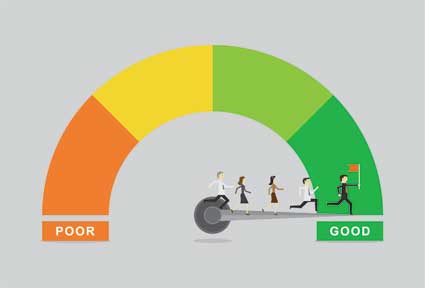Strategies for Creating a Millionaire Mindset
Introduction: Thinking like a millionaire will serve you well in life, not just in making millions. By following the steps you will get rid of bad habits and develop the characteristics that will allow success at whatever you do. If you want to do the hard work, you can earn your million. If you just want to improve your mind, you can do that, as well.
Once you work on yourself and develop a mindset that can lead to greater things, you can't let up, or you will go back to your previous ways. Learning to be in control of yourself, increase your knowledge and develop what it takes to earn wealth is not easily earned, and not easily kept up, unless you plan to do it. As in all things, intentionality, is the key. You have to take the steps to make it happen and to maintain it. You have to manage yourself, as well as your business. You are your best resource. Your insurance against the risk of letting up is management and monitoring, or your new-found skills and acquired mode of behavior.
In this article maintenance, management, and monitoring of your new way of thinking will be delivered. Self-examination must be done on a regular basis; you will have to stay healthy and exercise, get enough sleep, continue learning, and do things or attend events that will open both sides of your brain, stay focused and work very hard. You will learn how to manage all of these throughout the week, and how to monitor what you are doing. If you don't have a way to monitor yourself, you will slip up without seeing it coming. Monitoring is also a good way to continually make progress, because it is a good place to set some goals toward maintenance.
Maintenance: First let's review the steps of this major change in your life. You decide you want to think like a millionaire, so you can make that million dollars. To begin, you are going to have to find some time alone, and not a few hours -- but a few days. This is to do a thorough self-assessment of your habits, health, characteristics, skills, and how you think and make decisions. You have to evaluate everything you do and think, and how you behave. When you have done this, and made concrete lists of things you need to change, continue, or start, only then are you ready to do those things. It can't be done in a week or even two. You have to give yourself time to prepare your mind for the task ahead. You have to make these changes into habits and regular routine. When you get to the point you feel mentally strong, then you are ready to make some strategic plans for the rest of your life. Don't be in a rush, because rushing through important affairs will be a worthless activity. It may be months, or years, until you are ready. But once you have the mindset of strategic thinking, you will know.
Use your charts that you made in your self-evaluation, so you stay focused on what you need to change. Work hard at it on a daily basis and reassess continually. If you are in a dead end job or one you hate, knowing you are creating the mindset to make changes soon will give you the energy to get through the day. Don't make any changes to your job until you have the plans ready. When you are confident in your new habits, characteristics, skills, learning, and whole-brain thinking, you are ready to make that strategic plan, set goals and objectives for how you will reach those goals. If you go into your new life without a plan, you will lack any focus to make it. You have to know what you want, and how you intend to get there.
So you decide you are ready, and you make your strategic plans, and keep up the hard work moving toward your goals. It will be important to pay attention to your actions. Your actions reflect your thinking. On a daily basis -- later, once a week, but never less than that -- you must plan a time for honest reflection. It will only hurt you if you aren't honest with yourself. Practice honesty in all things. If you see you are not continuing to keep to the strategic way of thinking, or the plan you developed, don't let it slide. Right at that point, you need to focus more on where you are losing your strength of character and get back on the track. A self-analysis will keep you focused, a management plan will help you get it all done, and monitoring will become your new evaluation tool.
Management: Managing this lifestyle may be the very thing that most will neglect, but learning to manage your life will decrease anxiety, keep you healthy and fit, increase your intelligence, and make you successful. Managing does not mean merely keeping track of what you do or don't do. That's monitoring. Managing is learning to fit it all in. This happens through organization. Organization might be a characteristic you find you need to work on.
There are some rules for organizing and managing anything that are basic. First you have to get rid of anything that is not healthy, has no purpose, or simply won't fit. To develop a lifestyle, you need to organize not only the new behaviors you have worked on, but your living space, your work space, and your car. It is difficult to manage part of your life and not others. There are lots of organizational apps and ideas on the web.
Once you've discarded things that are not necessities, you have to decide what you use daily, hourly, weekly, or every moment. That's how you decide which things get the best place. You have to have a calendar system, an alarm system to alert you to daily appointments and activities, and you have to know when you are most alert. Use the less alert times as your exercise times. Now you have to make a decision about time. Though you should remain somewhat flexible, studies have proven that if you keep a fairly regular schedule, it takes less energy to accomplish all you want to accomplish in your day.
Decide what type of exercise you will do, and where. If you need to get out of the office, then plan that. If you need to be outdoors, then exercising outdoors will fulfill both needs. Maybe you prefer to do something at home, before work, or right after. You could have small weights, a jump rope, and a DVD in your office. Whatever you decide, do it at the same time every day. Don't make it hard to commit to daily. Keep it below an hour. Put this in your schedule. Next, determine what time you have to go to bed to get the eight hours or more sleep you require. Schedule that.
Eating healthy food is important. If you have little money, which you might if you've quit your job, learn what is cheap and healthy, make sure you cover the food groups, and don't waste money on junk or eating out. It is just too costly. There are ways to manage special meals by eating outdoors, inviting a friend over to cook with you, or by trying new recipes. If you work from home, make sure when you cook dinner you make enough for lunch the next day. Don't skip breakfast. The most difficult part of eating healthy is making yourself your own food and not grabbing fast food or running up an expense that is unnecessary. This is part of the hard work.
Then put on your schedule how you intend to open your whole brain. Will you put in an activity, a time for music, art, or a lecture? Know the resources in your community that are free. Most have an abundance, if not in the community, through the schools or community colleges. Look for clubs or other social activities that cost no money. Make sure each week you schedule time to learn something new. Sometimes you can do one thing that will suffice for two. If you are lacking in creativity, you might take in an art show and learn about the artist. If you invite a friend, you will have a social event.
The way to manage is to keep your list of the things you are working on handy -- and every week, schedule in how you will address these. Get creative and you will find that you can really enjoy the new habits, and learning.
Also, during this beginning period, you will have to figure out and make decisions how to manage your money. Hopefully you have made decisions and put them into your strategic plan, so you are working toward financial freedom. What you have to recognize is that these habits you are building -- not spending money, taking advantage of free resources, and scheduling with intention-- are the same habits that will sustain not only your first million, but that fifth and 30th.
Monitor Your Progress: Monitoring of progress is very important. It tells you where you've been, how fast you are making progress, and will help you judge when contemplating tweaking your plans. It also keeps you focused on what you want out of your life, because someone will always be there to try and convince you to just skip one day. That may happen, but you don't want it to. Monitoring your work will give you lots of motivation to stay on track. Someone may say, what's one day? But it isn't just one day of skipping exercise or eating right, it is a loss of control. When you lose your self-control in one part of your life, you might find it easy to let it go in another. When you are strong in one part, you will tend to be strong across the board.
How you monitor is a personal choice. Most will use a computer program that you will have access to you on your personal devices. Make a list of each thing you have to keep as habit, especially the hardest; and every evening, simply rate, yes, you were successful or no, you weren't. At the end of the week, figure your percentage of success. Keep that figure on your plans and watch it grow until your new habits are so ingrained you don't have to think about them anymore and you easily brush off those who try to pull you down. It's a lifestyle. If you plan to, skip a day of exercise to make another event, but make sure it is your choice and not a loss of control.
Making money and doing well financially will come. If you can get control of your personal life, you will find your financial life following the same way.
Summary: To find and keep success in reaching your goals to make a million dollars, or whatever they are, learning to think strategically is the best place to begin. When you are able to get your life in order and find you have developed self-control, you can do anything you put your mind to. People who say you can do whatever you want, and fail, did not consider their habits, characteristics, and behaviors. If you don't get control of these first and solidly, you will fail.
After you have worked hard to meet this task, and you are actually thinking like a millionaire or strategically, then you are on the road toward wealth. As in all things that matter, you know that it will require some maintenance, management, and monitoring. Managing will require good choices and scheduling in a format that works for you. You may need a visual put on the wall, or you may just prefer to keep it on your phone. It doesn't matter as only as you intentionally decide how you will spend your time each week. Take one week at a time. Allow yourself a "controlled" celebration at the end of the week if you need it, but don't reverse everything you've worked for in your celebration. Don't spend all your money or start smoking or drinking again. Anything you do that does not directly support what you want out of life will work against you.
Monitoring your progress will help you stay focused, update your goals, and show you that you can do this. Watching your growth over the months will be the proof of your success. At this point, success at self-control is the best way to claim success. Continuation of this success will see you to your goal. By not wasting money, continually learning, opening your whole brain, and getting rid of those bad habits will have more payoff than money. Your health will improve, you will be a more interesting person, and you will find more meaning in life, make discoveries about life, and enjoy every day. Working hard and in an area that you have a passion for is everyone's dream.
Example: Craig spent a week working on changes he needed to make. He set these in motion and worked hard to maintain, slipping occasionally, but making progress. It took him a year to feel confident that he was in control over his old habits and had started new healthy activities. He thought he had opened his mind and was thinking strategically, so he sat down and made a plan to do what he'd always wanted to do and how he could make real money at it. When he finished, he consulted with a financial adviser and went over his plans. Then he set up a meeting with a man who was well into becoming a millionaire and had done it by starting his own business. He asked the man if he would be willing to mentor and advise him from time to time. The man agreed and they made an appointment to review the plans. Daniel could begin to see how he could do this. He recognized it would be hard work, but if he managed his money and his life well, he also knew it was very possible. He looked at that first step toward the wealth and figured out how to make that step soon.
Consider this:
1. Of all the advice given by millionaires to James Tardy, who has his interviews on his blog called Eventual Millionaires, the number one tip from most was to not spend money, save money, and don't go into debt for anything.
2. If you want to earn money, you have to put it into moderate- to low-risk funds. Even putting it into a mutual fund when you are young will yield a very large return over time, because of compounding interest.
3. There are few get rich quick ways to become wealthy. If you find one, it will be a scam. Work hard, save your money, and enjoy your life.
































